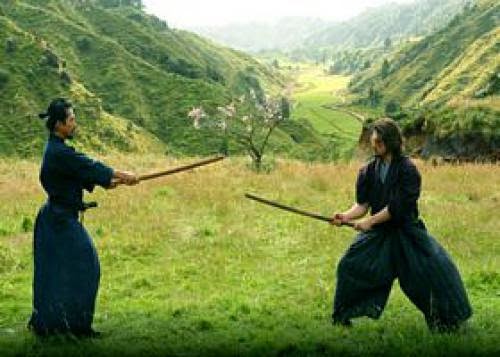
In English, the combination of "lacking/without" and "mind" may give the impression that I'm talking about a zombie or an automaton, but that is not the case. "Mushin" is, in fact, a completely natural state and something that almost all of us experience everyday. In reading this article, for example, you are not thinking about the mechanics of reading. All that you are doing now is reading. Unless you are using my article to learn how to read, there is no need to think about every individual reading skill that you have already mastered a long time ago. Doing so will only prevent you from understanding what is written here.
The same is true with martial arts. A samurai, for example, would rigorously train or program himself to learn all the movements, skills, and techniques he needs to use in fighting other samurais. He might practice a single sword stroke a thousand times or so just to perfect it. During the time of battle, when he is confronted by an enemy, his body reacts to his opponent and everything else in his environment without the interference of the mind. His body already knows what to do and is therefore able to execute all the attacks and defensive moves he previously learned without breaking a sweat. However, this can only be possible if he was in the state of "no mind." If he allowed himself to be bothered by discursive thought, thinking to himself something like: "Ok, Imma go downward straight cut, upward diagonal cut, straight thrust, and then send this snobbish jerk to hell!" then the enemy will most likely be able to stab him to death first.
THERE IS NO SELF, THERE IS NO OBJECT
A scene from The Last Samurai
"Because there is a self, there is an enemy. If there is no self, there is no enemy. 'Enemy' is that which is in opposition.... Every object with form has its opposite. When mind has no form, there is nothing to oppose it. When there is no opposition, there is nothing to fight against. This is called 'no enemy, no self.' When self and objects are both forgotten, there is a natural state of non-activity, of no trouble, of oneness.... This is not the same as being unaware; it means no calculating thought, and immediate natural response" - Neko no myojutsu' (Mysterious Technique of the Cat) by Issai Chozan
The mind always interferes with the realization of the objects we perceive. By interposing itself between your awareness and the objects you perceive, it acts like a curtain hiding the true essence of all the things you find in this reality. This is what we call subjectivity or self-consciousness. When you see an apple, for example, the mind might tell you something like: "Ok, I'm seeing an apple. The apple is red, It came from that tree. I know apples are nutritious and this one looks ripe and succulent. It probably has worms inside it coz it's been in the ground for a few days already, but whatever! I'm giving it to my husband."
You know... something to that effect.
The same holds true when you think about yourself. The mind tells you that everything that is connected to you or a part of you makes you who you really are, but that is not actually the case. If you think about it, you're not really your name, which is just a bunch of letters bundled together. Your job is also not who you are; it's just an activity. You can say the same thing about your body; it constantly changes as the years go by. Everything that you believe to be who you are, in reality, is not who you are.
In the practice of meditation, chanting, visualization, prayer, and many other forms of self-reflective activity, it is the disappearance of subjectivity or self-consciousness which allows you to enter the state of "no mind." When you practice Zazen (meditative sitting), for example, you will find it uncomfortable and you'll notice that your mind is extremely active at first. The reason is that the mind is turbulent and doesn't want to settle down. Observing your breathing, however, helps to focus the mind on a single activity. If you do this regularly for a long period of time, your concentration becomes stronger and stronger. Sooner or later, you'll reach a point where you are able to concentrate without any effort at all. This is often called one-pointedness.
Once you have mastered the technique of focusing on the breath, one-pointedness will transform into no-pointed attention, i.e., the state of "MUSHIN". It is at this point when you enter a new world where you have no opinions, views, beliefs, or ideas about your self or the objects that you perceive. All that you experience is "oneness" with everything. You can basically apply the same principle in learning any type of skill like in martial arts, sports, music, etc. In other words, if you really want to become extremely good at doing something, you have to let go of the mind and become one with what you are doing. No mind.







